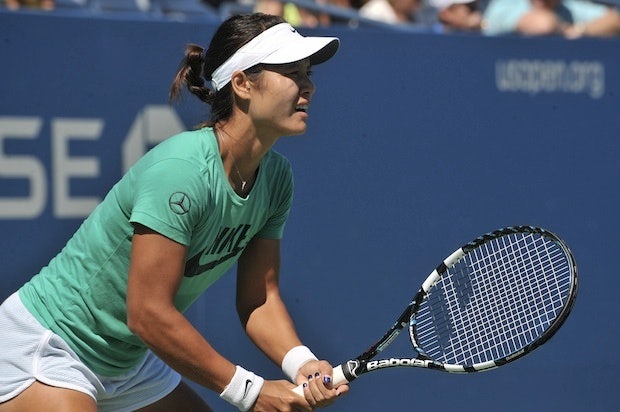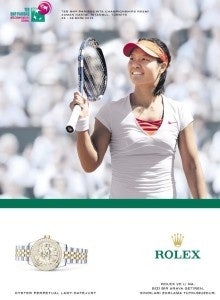
Chinese tennis star Li Na at the U.S. Open 2013. (asterix611/Flickr)
Rolex, Hilton and Mercedes-Benz—these are just a few of the global brands seeking to capitalize on China’s growing interest in tennis, sparked by the success of superstar Li Na and the strength of high-profile tournaments in Beijing and Shanghai, both of which wrapped up this month. While tennis’ popularity in China doesn’t match that of basketball or table tennis, the sport’s growing appeal among wealthy Chinese, who are looking for sports to follow that match their lifestyle and income, is drawing the attention of luxury brands from across the globe.

A Rolex ad featuring Li Na.
Li has attracted a number of endorsements deals in recent years, as she emerged as one of the world’s leading female tennis players. Since winning her first grand slam tournament, the French Open, in 2011, she has become one of the highest paid female athletes in the world, with more than a dozen endorsement deals worth an estimated $15 million a year. This year, Australian casino and resort operator Crown extended its sponsorship with Li for an additional two years in a multi-million dollar deal. “For us to have an association with the most popular athlete in the biggest country in the world is an honor,” Crown executive chairman said at a press conference in Beijing to announce the deal. “I don’t think anyone personifies the rise and success of China in a sporting sense more than Li Na.”
In 2011, Rolex, the Swiss watchmaker that is a title sponsor for the Shanghai Rolex Masters and a Diamond sponsor open for the China Open, which is hosted in Beijing, announced a multi-million-dollar endorsement with Li, who that year became the first Asian tennis player to reach the Australian Open finals. Rolex also sponsors tennis stars including Roger Federer and Ana Ivanovic. “As it’s one of the top brands in the world, I’m really honored to work with Rolex, and I look forward to joining other great athletes who are part of the Rolex community,” Sohu China quoted Li as saying at the time. (Rolex declined to comment for this article.) Li has also signed endorsement agreements in the past with companies including Nike, Haagen-Dazs and SpiderTech, a Canadian kinesiology tape company.

Li Na models in an ad for Haagen-Dazs aimed at placing the brand in a more upscale position than it stands elsewhere.
Other brands are attaching their names to the tournaments themselves, hoping to broaden their appeal with wealthy Chinese customers who watch the events. Mercedes-Benz, IBM, Corona, and Jetstar are among the sponsors of the China Open, while ANZ, FedEx, Heineken, and Coca-Cola are all sponsors of the Shanghai Rolex Masters. This year, Hilton Shanghai celebrated the tenth anniversary of its partnership of the Shanghai tournament. “We are very proud to once again be the official hotel sponsor for this global sporting event. Being the only masters event in Asia, the Shanghai Rolex Masters is destined to stand out as the flagship even in China and in Asia,” Hilton Shanghai general manager Gerd Knaust said in a statement in September.
Kevin Der Arslanian, a business analyst with China Market Research Group in Shanghai, says that because tennis’ popularity is still quite low in China, especially when compared to longstanding sports such as basketball and soccer, or sports at which China excels, such as table tennis, competition for sponsorship of tennis events in China is lower than other tennis tournaments around the world. But the sport’s popularity is growing, “particularly among the higher spheres of Chinese society where the wealthy are looking for sports to engage in, excel at, and follow, and sports that better fit their level of affluence. Tennis and golf have come out as two of the main choices, as they are viewed as lifestyle sports that they identify with,” Der Arslanian says. “In the end, when it comes to sponsoring sporting competitions in China, tennis is an increasingly costly and competitive market, rising to be on par with F1, as it grants unparalleled access to some of China’s elite.”